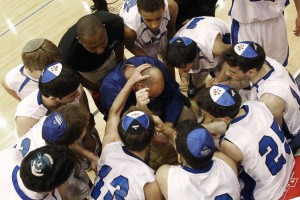Lessons from the Team That Wouldn’t Play on Shabbat
Visiting Houston a few months ago, at the start of the high school basketball season, I spent some time at the Robert M. Beren Hebrew Academy, the Modern Orthodox day school whose boys’ basketball team last year taught the nation about Shabbat.
After the Beren Stars, experiencing their best-ever, 23-5 season, qualified for the final round of the Texas Association of Private and Parochial Schools (TAPPS) playoffs and faced the possibility of games scheduled on Friday night or Saturday afternoon, the team became a huge story.
The New York Times, Washington Post, ESPN sports network and Associated Press, in addition to sympathetic blanket coverage by the Houston Chronicle and local TV stations, briefly made Beren the most prominent Jewish educational institution in the country, and its team the biggest Jewish-sports story in recent memory.
Unlike Sandy Koufax, a largely secular Jew whose decision not to pitch on Yom Kippur in the 1965 World Series is legendary, these were frum kids; news reports showed teens in basketball uniforms with highly visible kippot atop their heads.
In the end, after unfavorable publicity for TAPPS (its members are mostly Christian schools) and the threat of a lawsuit by a few Beren parents, the playoff schedule was changed. The Stars won their semifinal game on Friday afternoon but lost the final, by four points, on Saturday night after Shabbat.
The day I visited Beren, its front lobby showed no signs of all this. On the walls hung copies of letters students wrote to Israeli peers who had come under rocket fire from Gaza. Nearby, in a pair of small trophy cases, several awards won by Beren’s elementary school teams, mostly from years ago, were on display. But the Stars’ 2011-12 TAPPS second-place trophy was missing. Where was it?
“I have no idea,” said Samantha Steinberg, Beren spokesperson. She asked the secretaries and some lay leaders. They also didn’t know, and didn’t much care.
“For us, it wasn’t about basketball,” Steinberg said.
For Beren Academy, the basketball playoffs, which became a week-long teachable moment, were an extension of the school’s mission, two lay leaders explained in a discussion of how the administration handled the situation.
“The goal going in was not about basketball,” said Dr. Riva Collins, Beren board president. The goal, said Rick Guttman, vice president of facilities, was to teach the meaning of Jewish principles. They—and in a separate discussion, Rabbi Avi Pollak, former Judaic studies principal who has since made aliyah—explained how Beren turned sports into a Kiddush Hashem:
They left the decision-making to the rabbis. Though Beren Academy, a small school (fewer than 300 total elementary and high school students), has an active parent body, the decision of the team’s schedule was entirely in the hands of the rabbinic administration.
They made clear their priorities. Playing on Shabbat was never a possibility. Though some Orthodox athletes feel comfortable taking part in games or practices on Shabbat, walking long distances to the venue when necessary and not carrying equipment outside of an eruv, the school never considered this.
They invited a family discussion. The administration sent regular e-mail messages to parents, making sure that everyone received the same information.
They protected the students’ interests. With constant requests for interviews and access to the school, the administration closed some practices to the press and kept reporters out of classrooms and prayer services.
They kept Shabbat central. Beren turned the weekend of the final TAPPS playoffs in Dallas into a school-wide Shabbaton. Instead of accepting offers of home hospitality from Dallas’ Orthodox community, which would have kept players and the rest of the student body and their parents separate from each other, the school invited everyone to gather at a modest hotel several miles from the gym where the games were played.
Everyone—including some 150 supporters of the team—davened, ate and learned together. It was an “unforgettable, spiritual Shabbat,” Rabbi Pollak said.
A year later, Beren still sees and hears the results.
TAPPS has changed its scheduling policy “to provide the opportunity for all our member schools to participate.”
Non-Jews who meet members of the Beren family still congratulate them, saying, “You did the right thing.”
Seniors applying to college show more interest in choosing a school that has an established Jewish presence—kosher food, suitable worship services and a JLIC couple. (JLIC is the Orthodox Union’s Jewish Learning Initiative on Campus program.) And another Modern Orthodox day school whose basketball team had played bareheaded has decided that its boys will henceforth wear kippot on the court, Dr. Collins said.
If the Stars win a trophy this season, will that one find a place in the Beren Academy trophy case? Guttman shrugged. “Not important,” he said.
Steve Lipman is a staff writer for the Jewish Week in New York.

